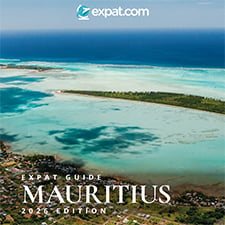
What are public utilities like in Mauritius? How do you get connected to the water or electricity network? What are the procedures like? Here are a few pointers.
It is estimated that 98% of households have access to running water. The water is properly treated and drinkable. However, during periods of heavy tropical rains, mudflows can cause the water to become contaminated with a brownish tint as it flows out of the tap. It is, then, recommended to drink bottled or boiled mineral water.
The water service in Mauritius
The water service is provided by the Central Water Authority (CWA), which currently supplies 96.4% of Mauritian households.
An important fact to remember is that Mauritius' water supply is not continuous, i.e., there are usually cuts during the day. These "dry" hours are generally longer during the summer because there is usually a drought before the rainy season. Every region has its own “supply schedule,” so it is important to check with your local CWA for valve opening times.
Obtaining a tank and a water pump
Mauritians usually have tanks installed at home to ensure that their home has a constant supply of water, including during off hours.
Water tanks are usually available at dedicated department stores (Duraco, Resiglas, Mammouth Courts, 361, Nabridas Mauritius) or even hardware stores if you take the time to inquire.
For some, this tank is optimized with a water pump for more efficient water flow. Ask for advice at the above-mentioned stores.
Water service rates
For domestic water supply in Mauritius, the average price is Rs 9 per m³, but the price increases with water consumption, as shown here.
For the supply of water to professional structures:
- Office-type structures, etc.: Rs 1,122 for the first 33 m³ and Rs 34 per additional m³;
- Commercial structures: Rs 391 for the first 17 m³ and Rs 23 for each additional m³.
How to pay your water bill?
You have several options to pay your CWA bill:
- By presenting your monthly bill at any post office;
- At the CWA office closest to your home;
- By automatic debit on a fixed date from your bank account.
Important:
If you're not knowledgeable in plumbing, hire a professional for the installation of your tank and/or water pump.
Connecting or reconnecting to the water service
Here are the steps to follow to connect or reconnect to the network.
For a first-time connection to the water service, fill out this form and go to the nearest CWA office with the following documents:
- Property deed;
- ID card or residence permit/passport;
- 2 approved site plans.
It is also possible to reconnect a unit to the water service. If you plan to rent a unit where the water supply has been disconnected at the request of the landlord, go to the nearest CWA office with the following documents:
- ID or Residence Permit/ Passport;
- BRN (in the case of supply for business premises);
- Previous water bill. There is a charge for these procedures:
- Reopening fee of Rs 550 for domestic supply;
- Reopening fee of Rs 1,750 for business supply.
Useful link:
Electricity in Mauritius
99.6% of Mauritian households are connected to the electricity network managed by the Central Electricity Board (CEB).The CEB is making a lot of efforts in terms of supply and to allow consumers to prepare themselves in case of power cuts due to works in the region. The CEB has set up an interactive map, which you can discover here.
As its name suggests, the Central Electricity Board is the electricity provider in Mauritius. It is a parastatal, government-owned body operating under the Ministry of Energy and Public Utilities. The CEB generates about 40% of the country's total electricity needs from its 4 thermal and 10 hydroelectric power plants.
The remaining 60% is generated by independent power producers.
The electrical system in Mauritius
The current charge is 220 V. The electric plugs are mostly "English" (square plugs) in houses, but this is not systematic. You should bring an adaptor for emergency use. In Mauritius, you can easily find plugs, extension cords and adapters in hardware stores, supermarkets and DIY stores. A generator may be useful during a tropical cyclone.
Connecting to the electrical network
Connection requests are subject to a connection fee and a security deposit. After payment, the CEB will make the necessary arrangements within 10 working days.
The CEB asks consumers to present the following documents for any request for connection to the domestic electricity network:
- National Identity Card;
- A copy of the deed of the property concerned by the connection;
- Or a copy of the lease agreement for tenants;
- Or a copy of a transcript, if the land has been transcribed for you;
- Or a letter of authorization from your landlord, if you are a tenant, and a copy of the landlord's title;
- And a list of declared electrical appliances to be connected in watts or kilowatts.
If the application is for a commercial structure, it must be made in person or in writing, along with the following documents:
- A duly signed letter from the business requesting the new supply, stating the total load connected;
- A list of the declared electrical equipment to be connected in watts or kilowatts;
- A copy of the company's registration card and a copy of its certificate of incorporation;
- A copy of the property deed if the premises are owned;
- A letter of authorization from the landlord or a copy of the lease agreement if the client is a tenant, as well as a copy of the corresponding property title;
- A building and land use permit, if applicable.
In the case of a registered company:
- A list of shareholders (those holding more than 10% of the shares);
- Director's national identity card or passport.
Electricity prices in Mauritius
Electricity prices vary according to usage. You can find the latest CEB price list here.
How to pay your electricity bill?
You have several options to pay your CEB bill:
- By presenting your monthly bill at any post office;
- At the CEB office closest to your home;
- By automatic debit on a fixed date from your bank account;
- On the my.t Money mobile application;
- By Juice transfer.
You can access your bill online here.
Useful link:
Gas in Mauritius
There is no "town gas" system in Mauritius. If you have chosen to cook and heat water with gas, you will have to buy 5, 6 or 12 kg gas cylinders.
The price of gas in Mauritius
Prices are regulated by the government:
- 5 kg - Rs 100 per cylinder;
- 6 kg - Rs 120;
- 12 kg - Rs 190.
Types of gas cylinders and where to find them
You will find 3 types of gas cylinders: red ones, sold in Total gas stations; blue ones in Shell gas stations; and yellow ones, which are harder to find. In addition to gas stations, you can find the necessary equipment at a number of authorized dealers.
Connecting a gas cylinder to your equipment
If you need to connect your boiler and/or hotplates to a gas cylinder, here are the best practices:
- The cap/expander called a "gas regulator" here, differs depending on the type of cylinder, so ask around or take a picture of your cylinder and bring it to the store to buy the suitable model;
- If you are unsure of how to connect the cylinder, ask a neighbor;
- It is highly recommended that the cylinder be installed outdoors;
- Remember to change the connecting hose regularly, referring to the date on the hose.
Good to know:
In Mauritius, you will also find systems that allow you to connect 2 pieces of equipment to the same gas cylinder!
Useful link:
Green energy in Mauritius
More than ever, Mauritius is working on refining its energy policy to increase the use of renewable and clean energy gradually, not only to reduce the country's dependence on fossil fuels but also to reduce its greenhouse gas emissions.
In the last budget, the government announced the implementation of a program called the "Green Transformation Package". Its objective is to enable the production of an additional 200 MW of electricity by 2025, which would bring the island's renewable energy production to 40% of the 60% target set for 2030.
We know that Mauritius is slowly moving to smart meters. Other initiatives include:
- The commissioning of 18 MW of battery storage to maintain grid stability;
- The implementation of a 2 MW floating solar project at Tamarind Falls Reservoir;
- Increasing the capacity of the Henrietta photovoltaic facility from 2 MW to 10 MW;
- Installation of 1,000 solar panels for low-income households;
- Programs designed specifically for small (household) and medium (commercial) users;
- Designing a framework for biomass for electricity generation;
- Finalizing the green bond framework for financing local and regional green projects.
- Other initiatives under development:
- The use of photovoltaic technologies;
- Increased access to solar energy technologies for solar water heaters;
- The creation of solid waste-to-energy plants;
- Pumping seawater for air conditioning;
- Installation of wind turbines;
- Development of liquefied natural gas (LNG) projects;
- Development of green building design services and equipment;
- Energy efficiency projects and energy audits;
- Incentives for the purchase of electric vehicles.
Incentives
The EDB reminds us that many incentives already exist so that the majority of Mauritians actively participate in the collective environmental effort:
- Solar photovoltaic projects are exempt from VAT;
- Provision for accelerated depreciation of income tax for green investment for investment in green technology equipment (50% straight line);
- Utility renewable energy projects are exempt from the land conversion tax;
- Businesses and households can receive a tax deduction for investment in solar unit equipment;
- All interest income from bonds issued to finance renewable energy projects that are approved by the MRA are tax-exempt.
As Mauritius is an island, it is more than ever concerned with the many environmental issues. Expats who wish to participate in this collective effort can, for example, take action through green electricity options.
To learn more about the various green facilities available in Mauritius for the public and businesses, you can contact Green Energy Co. Ltd, the "green" subsidiary of CEB.
Please note that some programs, for example, dedicated to the installation of photovoltaic kits, are reserved for beneficiaries registered in the social register of their region. It is, therefore, important to find out more before signing up for this type of initiative.
We do our best to provide accurate and up to date information. However, if you have noticed any inaccuracies in this article, please let us know in the comments section below.









